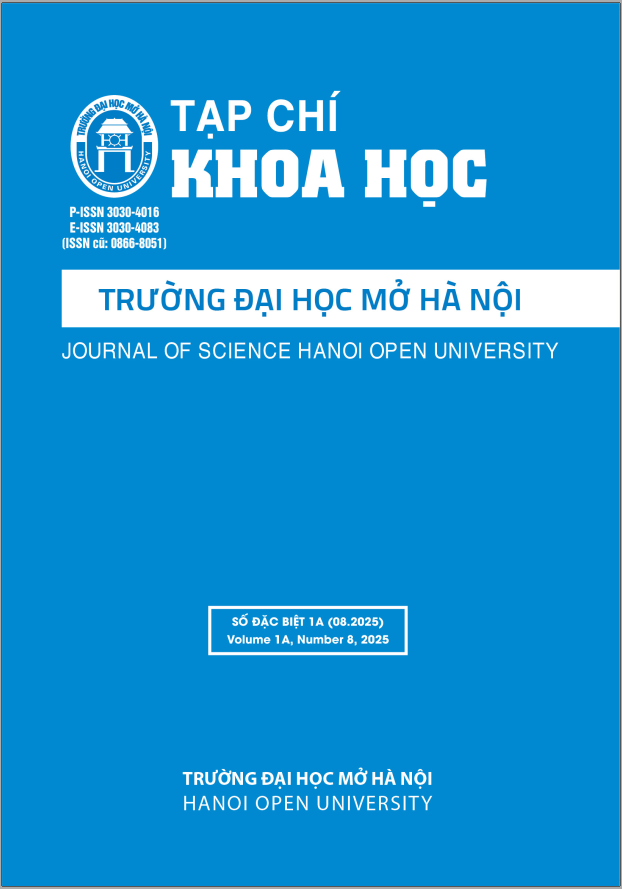HỌC TẬP VÀ NGHIÊN CỨU THỜI ĐẠI AI: SỨC MẠNH VÀ THÁCH THỨC
DOI:
https://doi.org/10.59266/houjs.2025.628Keywords:
trí tuệ nhân tạo, AI, Chat GPT, cá nhân hóa học tập, đạo đức, tự động hóaAbstract
Nghiên cứu sử dụng phương pháp khảo cứu, phân tích và tổng hợp tài liệu để đánh giá sức mạnh và thách thức của việc sử dụng AI, đặc biệt là ChatGPT trong giáo dục và nghiên cứu. ChatGPT, việc sử dụng máy học và mạng nơ-ron để tạo phản hồi mạch lạc, hỗ trợ học tập cá nhân và tự động hóa trong hoạt động đánh giá, nâng cao hiệu quả nghiên cứu qua phiên âm, phân tích dữ liệu và đánh giá tài liệu. Về thách thức, bài báo đề cập đến điểm hạn chế như thiên vị AI, thông tin sai lệch và lệ thuộc vào công cụ, các yếu tố thách thức tính toàn vẹn học thuật, tư duy phản biện và đạo đức. Khai thác AI có trách nhiệm, tự động hóa có chủ thể giám sát, sử dụng AI làm công cụ hỗ trợ, nghiên cứu sâu về AI để hạn chế tác động tiêu cực và tối ưu ứng dụng trong giáo dục là các khuyến nghị chính của nghiên cứu.
References
[1]. Brown, T., & White, M. (2023). AI-assisted peer review: Enhancing efficiency and accuracy in academic publishing. Journal of Scholarly Communication, 45(2), 112-127.
[2]. Downes, S. (2021). Connectivism and Learning in the Digital Age. Journal of Digital Learning, 15(2), 45-60.
[3]. Ghosh, A., & Banerjee, R. (2023). Natural language processing for social media analysis in research studies. Data Science and Society, 14(1), 55-72.
[4]. González-Calatayud, V., Prendes- Espinosa, M., & Roig-Vila, R. (2023). AI-Powered Assessment and Feedback in Higher Education. Journal of Learning Analytics, 11(1), 56-78.
[5]. Hodhod, R., Wang, W., & Khan,
S. (2023). AI-Assisted Curriculum Development: Aligning Education with Workforce Needs. Education Policy Journal, 20(3), 112-135.
[6]. Hong, J. (2023). AI in Lesson Planning: A New Era for Educators. Teaching and Learning Innovations, 18(4), 77-96.
[7]. Kim, T., & Rothman, E. (2023). Personalized Learning through AI: Innovations and Challenges. Educational Technology & Society, 26(3), 100-123.
[8]. Kissinger, H. A., Schmidt, E., & Huttenlocher, D. (2023). The Age of AI: And Our Human Future. Little, Brown and Company.
[9]. Kiyasseh, D., Laca, E., Haque, T., Miles, R., Wagner, T., Donoho, D., Anandkumar, A., & Hung, J. (2024). AI and NLP for Automated Feedback in Education. Journal of Artificial Intelligence in Learning, 29(2), 33-52.
[10]. Mitchell, M. (2023). Artificial Intelligence: A Guide for Thinking Humans (Updated ed.). Farrar, Straus and Giroux.
[11]. Patel, R., & Singh, V. (2023). AI-driven data analysis in research: Benefits and challenges. Data Science and Analytics, 19(3), 134-150.
[12]. Reigeluth, C. M., & Karnopp, J. R. (2023). Transforming Education: Designing Competency-Based Systems for Personalized Learning. Routledge.
[13]. Reyna, J. (2023). Digital AI-Driven Learning Design: Transforming Pedagogy for the Age. International Journal of Instructional Design, 9(1), 22-44.
[14]. Santos, P. (2023). Artificial Intelligence and Human Cognition: A Comparative Study. Philosophy of Mind Journal, 14(2), 30-46.
[15]. Searle, J. (2023). The Chinese Room Argument Revisited: AI and Symbol Processing. Linguistic & Philosophical Studies, 19(4), 22-38.
[16]. Siemens, G. (2015). Knowing Knowledge: A Connectivist Approach to Education. Technology & Learning, 8(3), 34-50.
[17]. Smith, J., & Johnson, K. (2023). Improving academic writing with AI-powered tools: A case study on Grammarly and QuillBot. Journal of Applied Linguistics, 27(1), 45-61.
[18]. Sridhar, A., & Rajshekhar, A. (2023). AI and Academic Integrity: The Future of Exam Proctoring. Higher Education Research & Development, 41(3), 65-82.
[19]. Williams, K. (2023). Ethical AI: Addressing Bias and Fairness in Machine Learning. Ethics & Technology, 11(3), 56-71.
[20]. Zhang, L., Liu, X., & Li, P. (2023). The role of automatic speech recognition in qualitative research transcription: Accuracy and challenges. Journal of Computational Speech Processing, 21(2), 78-95.
[21]. Zhang, X., Li, Y., & Wang, J. (2023). AI and Ethics: Ensuring Responsible Use in Digital Environments. Journal of Digital Ethics, 7(1), 40-58.
